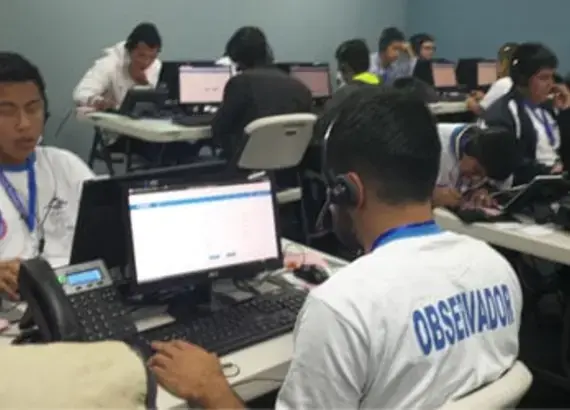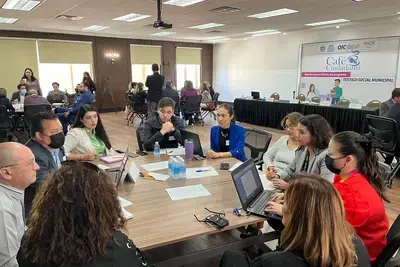
Success Story
Guatemalans Vote in Record Numbers in Face of Political Uncertainty and Discontent
Guatemalan citizens headed to the polls this month to elect a new president, vice president, congress and other state and municipal leaders. Despite a climate of political uncertainty and concerns over potential eruptions of violence, a record number of Guatemalans, approximately 70 percent, cast ballots in an overall smooth and peaceful electoral process.
The first round of general elections took place on September 6 against a backdrop of high-level criminal cases and popular civic protests against corruption. Starting in late April, a series of corruption investigations implicating senior officials surfaced that shook the political landscape, sparking large and continuous public protests and forcing the resignations of many cabinet members as well as the arrest of the vice president and chiefs of the central bank, tax administration agency and social security institute. Just days before the elections, President Otto Perez Molina resigned over corruption allegations and was placed under arrest, a first in Guatemalan history. Following constitutional procedures, the Guatemalan Congress appointed a new caretaker administration until an elected president and vice president take office in January.
To help strengthen the integrity of the elections, NDI partnered with a consortium of Guatemalan election monitoring organizations, Electoral Watch (Mirador Electoral). The consortium worked to identify and evaluate key issues throughout the campaign and on election day, encourage responsible electoral behavior and independently verify the accuracy of election results through a parallel vote tabulation -- a citizen observation methodology used to independently verify election results, also commonly called a “quick count” -- to address concerns regarding potential electoral fraud. Mirador Electoral deployed 2,400 observers throughout the country and gave special attention to documenting acts of violence, campaign spending irregularities and the inclusion of marginalized groups such as ethnic minorities and women throughout the electoral process. Mirador Electoral members discussed their findings in a press conference following the elections.
 Mirador Electoral members share their election observation findings at a press conference.
Mirador Electoral members share their election observation findings at a press conference.The Supreme Electoral Tribunal (TSE) welcomed Guatemalan civil society’s role in providing an impartial check on the electoral process and invited the director of Mirador Electoral member Citizen Action, the organization responsible for conducting the quick count, to share publicly the results of its quick count at an election night press conference before Guatemalan and international media and international election observers, among others. Citizen Action’s quick count affirmed TSE election-day preliminary results: no candidate received a majority of the votes, triggering a run-off on October 25. Political newcomer and former actor/comedian Jimmy Morales was the clear winner of this first round, but the race between former First Lady Sandra Torres, candidate for the National Unity of Hope party, and Manuel Baldizón, candidate for the Leader Party, for second and third was too close to call on election night.
“I’m happy to report that our observations confirm the legitimacy of the elections,” said Manfredo Marroquin, president of Citizen Action. “Given our country’s recent challenges, we hope these results will contribute to the construction of a climate of citizen trust in the results and the role of the electoral authorities.”
Since the quick count relies on a sample of polling stations, and the difference between the two candidates was less than 0.2% and fell within the statistical margin of error, Mirador Elector called for patience while the TSE completed counting all the ballots and reviewing legal challenges. However, one week after the elections, Baldizón announced he was terminating his candidacy, effectively determining that Morales and Torres will proceed to the second round, which the TSE subsequently confirmed.
Observations conducted by Mirador Electoral members Collective for the Defense of Women’s Rights in Guatemala (CODEFEM) and the National Network of Young Mayan Organizations (RENOJ) showed an increase in women’s political participation as polling station staff, with women accounting for an estimated 45 percent of polling station chiefs. However, significant obstacles to the meaningful participation of indigenous people and youth still exist. In 68 percent of the municipalities they observed, voters were unable to participate in their first language and indigenous people comprised only 17 percent of polling station staff.
Ana Maria Pablo Tercero, director of RENOJ, expressed a need for reforms to the country’s political system to address these deficiencies and increase the political participation of marginalized populations. “Reforms to the Law on Elections and Political Parties are necessary to establish guarantees, mechanisms and capacity for more and better participation of women, indigenous people and youth in political parties and in electoral institutions,” she said.
Violence was also an issue of concern, according to the Propaz Foundation, a member of Mirador Electoral that focused its observation on electoral violence. To date, 88 out of 338 municipalities experienced problems, including 49 on election day and 39 in the post-electoral period. The most serious incidents include acts of violence resulting in six deaths and injuries to 25 people, the burning of ballots and other materials at 16 polling stations, as well as damage to three municipal buildings and one party building. Although alarming, these incidents were far fewer than in past elections and, according to Propaz Foundation, and did not reduce the legitimacy of the elections.
Carlos Sarti, director of Propaz Foundation, explained that two factors helped to keep the electoral process relatively free from violent conflict: the TSE’s decision to hold the election without postponement on September 6 and the resignation of the president in the days leading up to the election.“Electoral conflict, understood as conflicts between political party members on election day, was not widespread,” said Sarti. “Nor were there large civic protests that resulted in conflict during the electoral process on September 6.”
NDI and Mirador Electoral will conduct another quick count for the October 25 run-off election and continue their observation through early 2016 to monitor incidents in the post-election period. Mirador Electoral has continued to advocate for immediate action by the Guatemalan Congress to approve pending electoral and political reforms to address problems identified in its election observation, including violation of limits on campaign spending and vote-buying.
These efforts were conducted as part of programs implemented with support from the Norwegian Ministry of Foreign Affairs, Swedish International Development Cooperation Agency and United States Agency for International Development.
Published on September 24, 2015



